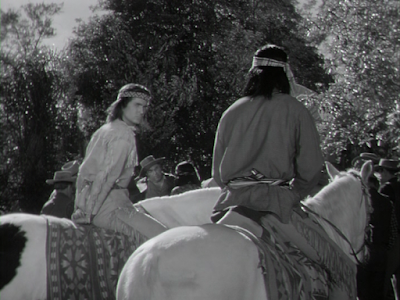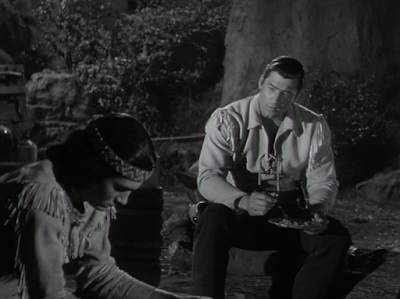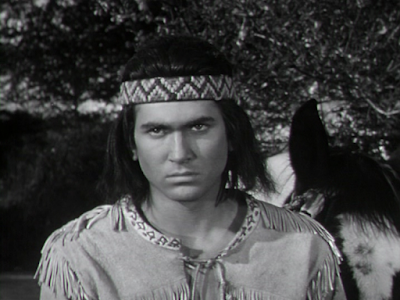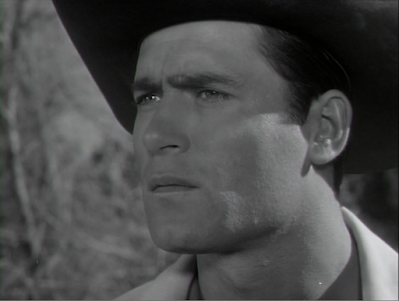In "White Warrior," Cheyenne Bodie (Clint Walker) is leading a wagon train. I really love wagon train stories (so much so that I wrote one), so that alone would probably make this episode a favorite. There's something so compelling for me about a group of people who have decided to leave home and family and familiarity behind them and are setting off into what they hope will be a better world. But they're also stepping out into the unknown, with uncertainty and hard work and a lot of possible dangers around them. Also, one of my great-grandmothers was born in a wagon train while her family headed to their new home in the Dakota Territory, so that might be part of why they fascinate me.
Anyway, the wagon train Cheyenne is leading has a couple of total creeps in it, Eli Henderson (Peter Whitney) and Matt Benedict (Morris Ankrum) in particular. Eli Henderson is a trader who wants to bilk settlers and American Indians out of whatever he can by selling them subpar and sometimes illegal goods. Matt Benedict is a harsh, hateful man who pushes his son Neal (Chuck Courtney) to bully others in order to prove what big and powerful people they both are. Cheyenne has plenty of trouble keeping the two of them from creating havoc even before the titular character arrives.
A handful of Apache warriors meet up with the wagon train and want to trade with Henderson. While Henderson is wheeling and dealing with them, Cheyenne notices that one young man riding with them (Michael Landon) is a Comanche captive, not an Apache. He trades a horse for the captive because he knows the Apache warriors will most likely brutally torture and then murder him when they get back to their own people.
Cheyenne frees the Comanche and learns that he speaks English. He also notices a distinctive scar on the young man's wrist. Some of the people on the wagon train, egged on by Henderson and Benedict, demand that Cheyenne get rid of the Comanche because they are sure he will kill them all in their sleep. Why? Because he's an Indian, and they don't trust Indian. When Benedict snarls, "He's an Indian. There's too many of them, anyway," Cheyenne retorts, "That's exactly how they feel about us. Only, they got better reason."
Then Cheyenne drops a little bomb on their let's-hate-the-Comanche party: the captive he freed isn't Comanche by birth, but by adoption. The captive confirms this reluctantly -- he is a young white man named Alan Horn who was captured by the Comanche when he was a child and adopted into their tribe through a blood ceremony that left the scar on his wrist.
The settlers still aren't cool with this, even after Cheyenne explains he knew Alan had been adopted by the Comanche because the same thing happened to him as a boy, only he was adopted by the Cheyenne instead. This is a big part of why I love this episode: we get to hear more about Cheyenne's backstory here than we do in any other episode I have seen. He was rescued by the Cheyenne after his family was killed by raiders, and they adopted him into the tribe. But, when he was in his teens, about the same age as Alan, he had to decide for himself where he belonged. And Cheyenne Bodie decided he wanted to rejoin the white world, even though he never would quite feel at home there or find total acceptance because of his Indian upbringing.
Cheyenne gives Alan Horn the same choice. If he wants to rejoin the Comanche, Cheyenne will send him on his way with a horse, water, food, and a knife. If he wants to try living with the white people, Cheyenne will help him find a place in that world instead. And that is another big reason why I love this episode -- Cheyenne never pushes Alan to decide one way or another. He lets him make his own choice. He never even tries to persuade him that one society would be better than the other.
The way this show as a whole treats American Indian characters was pretty revolutionary when it first aired in 1955. That was the height of the popularity for western shows and movies, and the vast majority of those portrayed the American Indians as nameless, faceless, remorseless enemies. Of course, there were exceptions. And, of course, Cheyenne's being raised by a native tribe is often used as a way to make him seem exotic and special. But the show insists on treating Indian characters with dignity, as intelligent individuals.
Anyway, Alan Horn does find some acceptance in the wagon train, particularly being befriended by Clara Bolton (Randy Stuart) and Lyle Gordon (Richard Garland). But others are determined to drive him out, especially when he reveals that he overheard Eli Henderson making a deal with those Apache warriors to sell them rifles and ammunition, which is against the law. Matt Benedict even tries to convince his son Neal to kill Alan Horn just because he was talking to a white girl.
Cheyenne believes and trusts Alan, and of course, the bad guys are stopped, the good guys are rewarded, and the wagon train is able to safely continue on the way to their new homes. This is a fifties show with a lot of kids in the audience, after all. But that doesn't keep it from taking a deeper, harder look at issues like trust, kindness, and belonging. The show as a whole doesn't shy away from difficult subjects, and that's another reason that I love it.
In fact, Cheyenne is one of my top favorite western shows of all time, despite my only having seen two episodes of it as a teen, and then all of season one when I was in my twenties. I now have all seven seasons on DVD and have been having a jolly time making my way through the show. I'm only halfway through season two, but I jumped ahead to rewatch this episode so I could review it this weekend.
Michael Landon's star was on the rise when he guest-starred in this episode. In a matter of months, he would be starring on Bonanza and become a household name. His performance here is understated and lovely, showing his inner conflict mainly through his haunted eyes and hesitant words.
This review is my contribution to the 10th Annual Favorite TV Show Episode Blogathon hosted by A Shroud of Thoughts all weekend long.
I've been crushing on Clint Walker for more than thirty years, so here is one last shot of him looking particularly good in this episode.













That does seem to be an uncharacteristically enlightened view of indigenous people in that era, especially in a western. According to Wikipedia, that episode was Michael Landon's TV debut. He had his first appearance in a movie that year as well, but only as an uncredited extra ("boy in pool hall").
ReplyDeleteDebra, I wonder if the Warner brothers' own experiences with anti-antisemitism gave their studio a different perspective on the relations between white settlers and American Indians?
DeleteI don't know what's up with Wikipedia, but IMDb.com lists a 1955 episode of Clyde and the Tenderfoot as Landon's first TV role. That predates his first (uncredited) appearance on Cheyenne in 1956 by almost six months, and this one by several years. By the time this episode aired, he had more than two dozen tv show eps under his belt, plus several onscreen roles, including that uncredited "boy in pool hall" in These Wilder Years back in 1956.
Oops, that was meant to just be antisemitism -- don't know where that extra anti-came from!
DeleteWell, you know what they say about Wikipedia. I suspect IMDb is more accurate.
DeleteDebra, yeah, I tend to trust IMDb over Wikipedia pretty much all the time.
DeleteThank for a lovely post on this interesting episode. CHEYENNE is also one of my favorites, too. Clint Walker was great in it.
ReplyDeleteJacqueline, Clint Walker had such an amazing presence, didn't he? I love how often the directors of this show let him just look at another character to convey things without dialog.
DeleteI was trying to find a specific episode of Cheyenne online last week for an article and was unsuccessful. You must have a collection of the series. Peter Whitney, BTW, is the villain in an episode of The Rifleman, another show that is part of that article i am writing. (It's a night of TV shows from the day I was born... scheduled to post on this year's birthday, so I still have time to locate the Cheyenne ep... It wasn't this one however.)
ReplyDeleteQuiggy, yeah, I have the whole series on DVD. I see things come and go on streaming services too often to trust them keeping things around that I want to rewatch.
DeletePeter Whitney was awfully good and playing baddies! That's a fun idea for a post :-D
As you already know, I love the Warner Bros. Westerns. Cheyenne is my favourite besides Maverick. I always thought the Warner Bros. Westerns were a lot more progressive than most Westerns with regards to Native Americans, especially Wagon Train where they all seemed to be stereotypes who speak in broken English! Anyway, this is a great episode with which to be introduced to Cheyenne. You get to learn a lot about Cheyenne, and I love seeing Michael Landon before he was Little Joe! Anyway, you did a great job writing about this episode. Thanks for taking part in the blogathon!
ReplyDeleteTerence, the WB westerns are in a class unto themselves! They really did some remarkably good stuff with them -- especially when it came to addressing issues like marginalization, the treatment of women, and so on.
DeleteThanks for hosting this event again! It's always a favorite for me :-)
Over the years I've been vaguely aware of the Cheyenne series, and I don't think I've ever seen an episode (in spite of liking Clint Walker a lot).
ReplyDeleteThis episode is a great choice for a couple of reasons -- for its anti-hate message and Michael Landon's debut. It reminds me of my favorite TV western, The Rifleman, which emphasized family, community and tolerance.
Brian, if you like Clint Walker, I hope you can see some episodes of this show! He's just wonderful on it. And it definitely has some things in common with The Rifleman (another big favorite of mine) with how it will dig into serious, weighty issues.
DeleteI enjoyed reading about this episode! I went on a westerns film journey a few years ago, and have lately been trying to add TV shows to the mix. I will definitely add Cheyenne to my watchlist -- I hope I can find it.
ReplyDeleteAlso, on a completely different subject, if you're interested, I'd love to invite you to consider membership in the Classic Movie Blog Association -- it's a great group of old movie lovers like you! http://clamba.blogspot.com/p/a.html
-- Karen
Karen, I'm glad you enjoyed this! Cheyenne is a marvelous show -- the first hour-long western show meant more for adults than kids, actually. You can get it on DVD quite easily and reasonably. Not sure if it is streaming anywhere or not.
DeleteAlso, I am SO honored to be invited to consider joining the Classic Movie Blog Association! I have been interested in them for years, but I always assumed my blog wouldn't qualify because I write about a lot of modern movies and shows too, as well as my books and so on. But maybe I would be qualified after all? I just visited the link you left, and it does say "a substantial amount of blog content must be devoted to classic films," but that doesn't say "majority," so... I will go ahead and apply! Thank you again for the invitation!
Great review! I've never heard of this show, but it sounds fascinating. And refreshing. I'm sure my parents probably watched it as teenagers.
ReplyDeleteThanks, Rebecca! This show really deserves more attention -- I am probably going to be highlighting it a bit during this year's Legends of Western Cinema Event because I am very into it right now. I've read that it was the first hour-long dramatic TV series! Cool, huh?
Delete